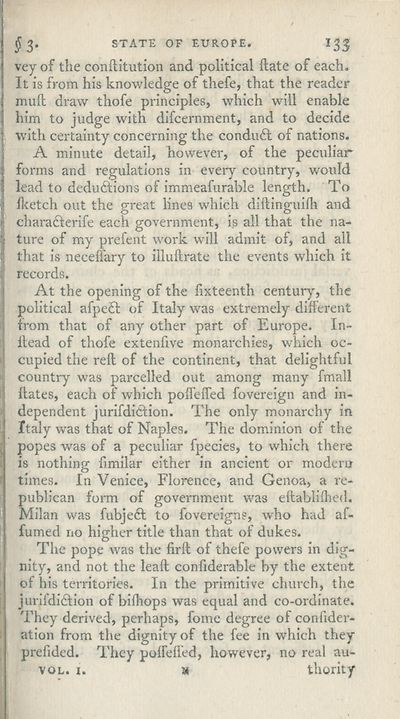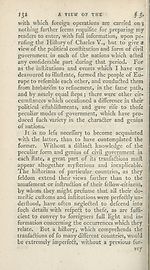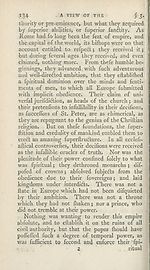Download files
Complete book:
Individual page:
Thumbnail gallery: Grid view | List view

$3* STATE OF EUROPE. I33
vey of the conftitution and political ftate of each.
It is from his knowledge of thefe, that the reader
mult draw thofe principles, which will enable
him to judge with difeernment, and to decide
with certainty concerning the conduct of nations.
A minute detail, however, of the peculiar
forms and regulations in every country, would
lead to dedudtions of immeafurable length. To
Iketch out the great lines which diltinguilh and
charadterife each government, is all that the na¬
ture of my prefent work will admit of, and all
that is necelfary to illuftrate the events which it
records.
At the opening of the fixteenth century, the
f political afpcct of Italy was extremely different
from that of any other part of Europe. In-
ilead of thofe extenfive monarchies, which oc-
1 cupied the reft of the continent, that delightful
j country was parcelled out among many fmall
ftates, each of which polfelfed fovereign and in-
> dependent jurifdidlion. The only monarchy in
! Italy was that of Naples. The dominion of the
[ popes was of a peculiar fpecies, to which there
is nothing fimilar either in ancient or modern
I times. In Venice, Florence, and Genoa, a re¬
publican form of government was eftabliftied.
Milan was fubjeft to fovereigns, who had af-
fumed no higher title than that of dukes.
The pope was the firft of thefe powers in dig¬
nity, and not the leaft confiderable by the extent
of his territories. In the primitive church, the
jurildidtion of bilhops was equal and co-ordinate.
' They derived, perhaps, fome degree of confider-
ation from the dignity of the fee in which they
prefided. They poftefted, however, no real au-
vol. 1. :« thority
vey of the conftitution and political ftate of each.
It is from his knowledge of thefe, that the reader
mult draw thofe principles, which will enable
him to judge with difeernment, and to decide
with certainty concerning the conduct of nations.
A minute detail, however, of the peculiar
forms and regulations in every country, would
lead to dedudtions of immeafurable length. To
Iketch out the great lines which diltinguilh and
charadterife each government, is all that the na¬
ture of my prefent work will admit of, and all
that is necelfary to illuftrate the events which it
records.
At the opening of the fixteenth century, the
f political afpcct of Italy was extremely different
from that of any other part of Europe. In-
ilead of thofe extenfive monarchies, which oc-
1 cupied the reft of the continent, that delightful
j country was parcelled out among many fmall
ftates, each of which polfelfed fovereign and in-
> dependent jurifdidlion. The only monarchy in
! Italy was that of Naples. The dominion of the
[ popes was of a peculiar fpecies, to which there
is nothing fimilar either in ancient or modern
I times. In Venice, Florence, and Genoa, a re¬
publican form of government was eftabliftied.
Milan was fubjeft to fovereigns, who had af-
fumed no higher title than that of dukes.
The pope was the firft of thefe powers in dig¬
nity, and not the leaft confiderable by the extent
of his territories. In the primitive church, the
jurildidtion of bilhops was equal and co-ordinate.
' They derived, perhaps, fome degree of confider-
ation from the dignity of the fee in which they
prefided. They poftefted, however, no real au-
vol. 1. :« thority
Set display mode to:
![]() Universal Viewer |
Universal Viewer | ![]() Mirador |
Large image | Transcription
Mirador |
Large image | Transcription
| Antiquarian books of Scotland > Kings & rulers > History of the reign of the Emperor Charles V. > Volume 1 > (151) |
|---|
| Permanent URL | https://digital.nls.uk/109184143 |
|---|
| Description | By William Robertson. London : Cadell and Davies, 1798. |
|---|---|
| Shelfmark | ABS.1.76.13 |
| Additional NLS resources: | |
| Description | Thousands of printed books from the Antiquarian Books of Scotland collection which dates from 1641 to the 1980s. The collection consists of 14,800 books which were published in Scotland or have a Scottish connection, e.g. through the author, printer or owner. Subjects covered include sport, education, diseases, adventure, occupations, Jacobites, politics and religion. Among the 29 languages represented are English, Gaelic, Italian, French, Russian and Swedish. |
|---|

